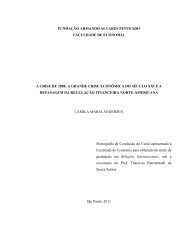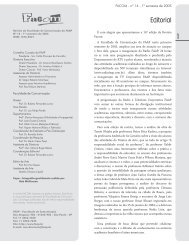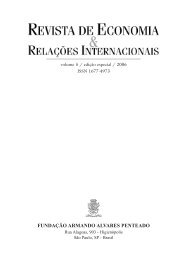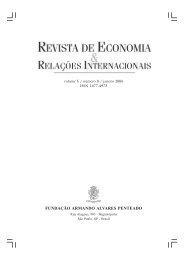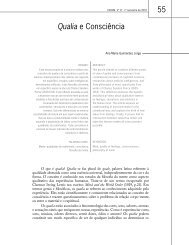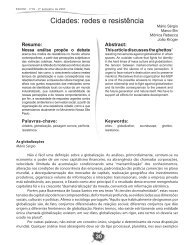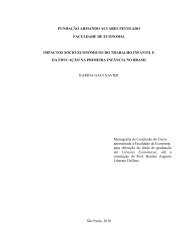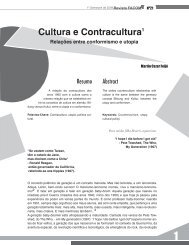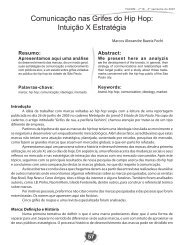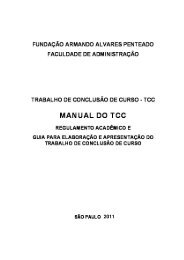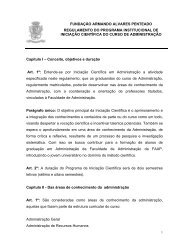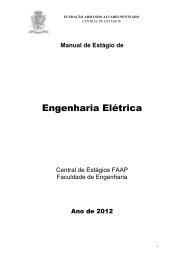GUIA DE ESTUDOS / STUDY GUIDE / GUIA DE ESTUDIOS - Faap
GUIA DE ESTUDOS / STUDY GUIDE / GUIA DE ESTUDIOS - Faap
GUIA DE ESTUDOS / STUDY GUIDE / GUIA DE ESTUDIOS - Faap
Create successful ePaper yourself
Turn your PDF publications into a flip-book with our unique Google optimized e-Paper software.
ing a decision on a particular dispute, it may send a<br />
request to the International Court, which will respond<br />
with an advisory opinion; in other words, the Court will<br />
give influential advice on how to decide on the issue,<br />
always in consonance with international law.<br />
Statement of the Issue<br />
FACTS<br />
1966 to 1975: France conducted 41 atmospheric tests<br />
on the Muruoa atoll, located on the French Polynesia.<br />
1973: Australia and New Zealand, the closest neighbors<br />
of the French Polynesia, instituted legal proceedings<br />
against France to the ICJ. The consequence was<br />
that France could continue with the nuclear tests in<br />
French Polynesia, but they must be no longer atmospheric.<br />
France switched the tests to underground tests.<br />
1976 to 1991: France conducted 134 underground<br />
tests in boreholes. The last test was in 1996.<br />
1996: France agreed to pay a 10-year compensation<br />
package to French Polynesia.<br />
Greenpeace created a worldwide non-nuclear tests<br />
movement against France and its nuclear tests in<br />
French Polynesia, having The Rainbow Warrior as the<br />
main ship of its navy. 10 On 10 th July of 1985, two days<br />
before The Rainbow Warrior anchored to the Muruoa<br />
atoll, an explosion occurred and the ship sunk, killing<br />
one member of the crew.<br />
The explosion was caused by two bombs planted by<br />
two agents of France’s secret service, Mr. Dominique<br />
Prieur and Mr. Alain Mafart. They were sent to a military<br />
base in French Polynesia and released in less than<br />
two years.<br />
France’s Prime Minister, Mr. Laurent Fabius, assumed the<br />
responsibility of the crime and said that the agents of<br />
the DGSE (Direction Generale de la Securite Exterieure/<br />
General Directorate for External Security) sank The Rainbow<br />
Warrior as they were instructed to do so.<br />
80<br />
VIII Fórum FAAP de Discussão Estudantil – 2012<br />
There was also a spy infiltrated in the Greenpeace, Mrs.<br />
Christine Cabon, also from the DGSE, who evaded arrest<br />
in Israel and has been missing until present days. 11<br />
JURISDICTION<br />
The ICJ is an international court, hence the name, that<br />
discusses disputes between countries around the<br />
world; therefore, it acts as a world court. The Court has<br />
a dual jurisdiction; it may decide contentious cases or<br />
give advisory opinions.<br />
The Court’s role is to settle, in accordance with international<br />
law, legal disputes submitted to it by States and<br />
to give advisory opinions on legal questions referred<br />
to it by authorized United Nations organs and specialized<br />
agencies.” 12 (…)“It decides, in accordance with<br />
international law, disputes of a legal nature that are<br />
submitted to it by States (jurisdiction in contentious<br />
cases); and it gives advisory opinions on legal questions<br />
at the request of the organs of the United Nations<br />
or specialized agencies authorized to make such<br />
a request (advisory jurisdiction). 13<br />
In the contentious cases, the court has to rule a decision<br />
based on international law; it has do decide a legal<br />
dispute submitted to it by a State. The definition of<br />
an “international legal dispute” is: “A disagreement on a<br />
question of law or fact, a conflict, a clash of legal views or<br />
of interests.” 14<br />
Nevertheless, it is important to stress that International<br />
Organizations cannot appear before the Court;<br />
when it comes to contentious cases, only States have<br />
such authorization. However, International Organizations<br />
do have a specific procedure to obtain aid from<br />
the Court, the so called “advisory opinion”. An advisory<br />
opinion is a function that the Court has, in which only<br />
International Organizations may request one. Once an<br />
organization requests an advisory opinion 15 , the Court<br />
advises which State or other Organization may be likely<br />
to have important information to provide and the<br />
chosen one will proceed with an oral or written statement,<br />
containing the useful information. 16




